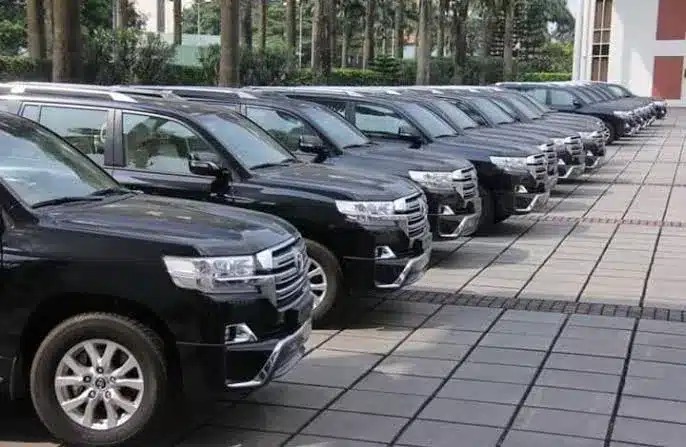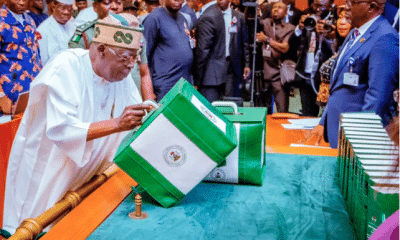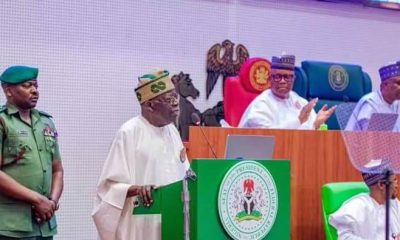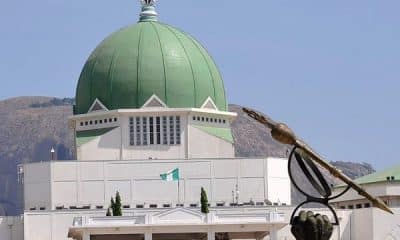Nigeria News
Proposed N160 Million SUVs For Lawmakers Violate RMAFC’s Law – Reports

National Assembly’s proposed N160 million Sport Utility Vehicles (SUVs) for legislators violates the prescribed package for lawmakers by the Revenue Mobilisation Allocation and Fiscal Commission (RMAFC), findings revealed.
Naija News reports that there have been a series of controversies over the planned vehicle acquisition, considering the current economic situation in the country.
However, despite the opposition both in the political space and by concerned Nigerians, the National Assembly has maintained it is buying “operational vehicles” for all the 469 members.
The federal lawmakers are said to have rejected cheaper Sedan and Salon cars and chosen instead expensive luxury sport utility vehicles (SUVs), thereby violating the revenue package put together for them and other public office holders by the RMAFC.
Section 84 of the Nigerian 1999 constitution gives RMAFC the mandate for determining the salaries and allowances of public officials, including members of the National Assembly.
“There shall be paid to the holders of the offices mentioned in this section such remuneration, salaries and allowances as may be prescribed by the National Assembly, but not exceeding the amount as shall have been determined by the Revenue Mobilisation Allocation and Fiscal Commission,” Premium Times quotes section 84 of the constitution in its recent report.
RMFAC had published details of the remuneration package due for political, public and judicial office holders in the previous years. The last publication by the RMFAC in 2007, states that members of the National Assembly are not entitled to operational vehicles, but rather an optional car loan that must not exceed 400 per cent of their annual basic salaries.
Lawmakers’ Car Loan Must Not Exceed N8 Million
According to the most recent published list, a senator receives an annual basic salary of N2.02 million. Consequently, they are eligible for a car loan of up to N8.1 million, which equates to 400 per cent of their basic salary. Similarly, a member of the House of Representatives with an annual basic salary of N1.9 million can obtain a car loan from the National Assembly not exceeding N7.9 million.
However, despite the challenging economic circumstances faced by Nigerians, the members of the 10th National Assembly have disregarded the recommendation of RMFAC and instead chosen to purchase luxury vehicles for “legislative oversight”. This decision has been widely criticized by many Nigerians, who view it as insensitive.
How Lawmakers Reject Saloon Cars, Opt For SUVs
Reacting to the controversies surrounding the proposed SUVs for lawmakers, a member of the House of Representatives, who spoke to journalists recently on condition of anonymity, said members of the House rejected Saloon Cars and insisted on either Toyota Prado or Toyota Land Cruisers because many in the last Assembly did not use the other type of cars they collected for official functions.
“Most of the lawmakers rejected the option of saloon cars because many had to give the one shared in the 9th Assembly to their wives. Those vehicles are probably not more than N80-N90 million, that particular vehicle we are talking about. In fact, some people are not going to get the vehicle until January,” the lawmaker told Premium Times.
Naija News understands that in 2015, Nigerian lawmakers bought Peugeot 508 saloon cars for themselves from the public purse and in 2020 bought Toyota Camry saloon cars. On both occasions, the National Assembly went above the threshold recommended in the RMFAC list. However, the 10th National Assembly have chosen SUVs, a brand that has become a status symbol for Nigerian politicians who have access to public funds.
The insensitiveness of the federal lawmakers and their latest proposal for foreign brands has also drawn criticism from Nigerians, who complained that the lawmakers could have patronised Nigerian brands to boost the local automobile industry. The Centre for Social Justice, in a statement on Tuesday, said the lawmakers exported jobs by ordering from foreign brands instead of local brands.
Lawmakers Rejected Our Proposal For Local Vehicles
Reacting to the matter earlier, the CEO of Nord Motors, an indigenous local automobile company, Oluwatobi Ajayi, said his company had submitted a proposal to the National Assembly on the purchase of locally made vehicles for all lawmakers, but that it was not given attention.
In a post via his official X handle, Ajayi expressed regret that the lawmakers have continued to reject local automobile manufacturers who approached them with proposals and instead continued to patronize foreign vehicles.
“The National Assembly buying foreign-built vehicles at this time is dispiriting, especially when you consider that we are all trying to promote buy Nigeria to grow the Naira.
“A sad part of this is that we (assemblers and manufacturers of vehicles in Nigeria) actually proposed our vehicles and explained how it would make a lot of financial, technical and political sense to buy from us, but they didn’t even entertain the idea for long,” Ajayi wrote on the microblogging platform.
The Nigerian automobile industry has grown in recent years, with brands like Innoson, Nords, Pro-Force and others producing high-end vehicles, including SUVs. However, it seems Nigerian lawmakers consider them beneath their status.
The appetite of the lawmakers for luxury appears to be at variance with the economic realities of Nigeria and the call for a cut in the cost of governance.
In a statement released on Sunday, the spokesperson of the House of Representatives, Akin Rotimi, stated that the lawmakers also have the option to retain the vehicles at the end of their tenure in 2027, provided they settle their dues with the National Assembly.
“For the duration of the 10th assembly (2023 – 2027), the vehicles shall remain the property of the National Assembly. At the expiration of the tenure of the 10th Assembly in 2027, should the extant assets deboarding policy of government still be in place, honourable members may have the option of making payment for the outstanding value of the vehicles to government coffers before they can become theirs, otherwise it remains the property of the National Assembly,” he said.
Despite the clear provisions of the constitution to the contrary, the National Assembly has always arbitrarily fixed their allowances far above what RMFAC prescribes. In July, the Senate shared N2 million to each member as recess allowance against the 10 per cent of annual basic salary prescribed by law.












